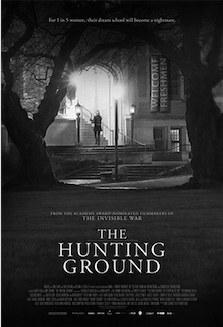Urban’s affirmative consent curriculum takes spotlight

From an article on the front page of the New York Times to student interviews on the Today Show, Urban has recently received lots of attention as part of a national discussion on consent and sexual assault.
The New York Times article, “Sex Ed Lesson: ‘Yes Means Yes,’ but It’s Tricky”, written by Jennifer Medina, was prompted by a California law passed on Oct. 1st, 2015, regarding affirmative consent education in public high schools.
Medina originally got in touch with Zaloom through her work creating a companion guide for the documentary “The Hunting Ground”, an exposé on sexual assault on college campuses.
Medina wanted to feature Urban due to, as Zaloom said, “How we teach about consent because of all the media attention, and because of all the laws that are being signed right now.”
After the publication of the New York Times article, the producers of the Today Show visited Urban on October 15th to conduct interviews with Zaloom and several 10th and 11th grade Urban students.
In Zaloom’s guide, she begins with a powerful, compelling summary of the film, and goes on to cover consent, bystander intervention, healthy relationships, and the relationship between substance use and sexual assault. Zaloom said, “(The guide) talks about school’s responsibilities when showing something like this, also in educating kids about sexual assault.”
Zaloom has been teaching affirmative consent at Urban for 11 years and said, “(The Urban health curriculum is) really about how to have healthy relationships, how to educate people on how to treat you, how to listen for how other people want to be treated, respect and responsibility and reciprocity. We’ve been teaching that stuff for a really long time.”
Experience working with “The Hunting Ground” also gives Zaloom extra credibility with her students at Urban. Connor Elliott (‘18), who is currently taking Zaloom’s health class said, “I think it definitely helps me listen to her because it says that she’s a professional, that she does this 24/7, and that she knows what she’s talking about.”
Urban makes sure to highlight its sex-positive, affirmative consent based philosophy in the curriculum overview. According to the school’s website, “Sophomore health focuses on human sexuality, personal integrity, and where the two intersect. … The goals of the course are: … to practice articulating and standing up for one’s beliefs, and to deconstruct and better understand interpersonal relationship dynamics and how one fits into them.”
NBC producer Stephen Weeke, who conducted interviews at Urban for the Today Show, said that Urban students are well educated and well spoken regarding sex and consent. He said “You’re a very good school, your kids are all very intelligent … there are some very clear opinions, people aren’t afraid to talk, so that’s great.”
Another student of Zaloom’s, Margot Bickler (‘18), said, “I think the most helpful part of the health curriculum is definitely the consent unit. Also learning about sex, and not romanticizing it, and that it can be awkward. And all the safety precautions about it.”
The recent media attention is fueled by an increasing national interest in affirmative consent. Laws regarding sexual assault are being passed and studies are being done that reveal the prevalence of sexual assault, especially on college campuses.
A study by the Westat Research Corporation, commissioned by The Association of American Universities and published September 21st, 2015, found that 27.2 percent of female college seniors reported at least one occurrence of unwanted sexual contact over the course of their time as an undergraduate.
In response to studies such as this, a California law titled “Student safety: sexual assault” was passed in 2014, requiring universities to have procedures in place for dealing with student sexual assault charges.
More recently, California’s senate took consent laws a step further, mandating the inclusion of affirmative consent in public high school health curricula. Section two of this law reads “(Health classes must include) discussion of the affirmative consent standard… and skills pupils use to establish boundaries in peer and dating relationships.”
Even so, the law does not apply to private schools, and some students whose schools do not provide affirmative consent education wish they were receiving it.
Katherine Sweeney, a Branson sophomore, said “People don’t talk about consent enough, or at all, at Branson. I talked to someone who was a junior last year and it was lightly discussed, they said, in their class, but it was more about protection, like condoms and STDs, which is good, and people should know that, but I think it’s also important to set the atmosphere and the culture for consent.”
Zaloom said she hoped that “The movie will heighten awareness, and inspire people to act to affect social change”.
The film “The Hunting Ground” is available on Amazon, and the Today Show clip, titled “‘Yes means yes’ law spotlights consent in sex ed classes,” can be found on the NBC News website.











